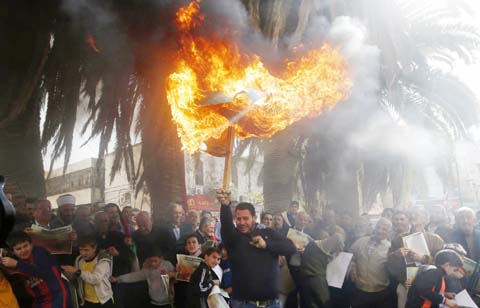
AFP, Jerusalem :
It is 4:30 am and Mufeed Shawana is rushing to Al-Aqsa Mosque, as the first Muslim call to prayer of the day rings out across the Old City of east Jerusalem.
But he stops short when asked how he feels that the sound echoing from the minarets could soon be dampened.
“It upsets me. The calls to prayer have happened for 1,400 years.”
A bill backed by Prime Minister Benjamin Netanyahu to ban mosques around Israel and annexed east Jerusalem from using loudspeakers to amplify late night and early morning azans, or calls to prayers, has been approved by a ministerial committee ahead of a parliamentary debate and voting.
It has been temporarily blocked but the government is still confident of pushing it through.
Shawana argues that nobody would deny Jews their own religious rituals, which are “their right”.
“This is our right,” he adds, before disappearing inside the mosque to pray.
The dispute around high-decibel minarets is not unique to Israel, which argues that other states, including in Europe and North Africa, have similar restrictions to those it is looking to implement.
But it has touched a raw nerve in Israel, where many in its minority Arab population-around 17.5 percent of the whole and overwhelmingly Muslim-believe Netanyahu’s rightwing government is systematically persecuting them.
They also worry that their connection to Al-Aqsa, the third holiest site in Islam, is under threat.
Large numbers of Israeli Jews view the azans as noise pollution, with the bill’s sponsor Motti Yogev, of the far-right Jewish Home party, arguing they disturb the peace of hundreds of thousands of people.
He has also claimed that in some cases they are used by religious leaders to incite against Israel.
In its current draft, the law would prevent the summons to worshippers between 11:00 pm until 6:00 am from being relayed on loudspeakers.
Palestinians and Arab Israelis have organised protests against the ban, with an Arab Israeli MP performing the azan in Israel’s parliament to the fury of some of his Jewish colleagues.
Government watchdogs call the bill a threat to religious freedom and the Arab League has termed it “a very dangerous provocation”.
Arab Israelis, who largely identify as Palestinians, are the descendants of Palestinians who remained on their land after the creation of the state of Israel in 1948.

